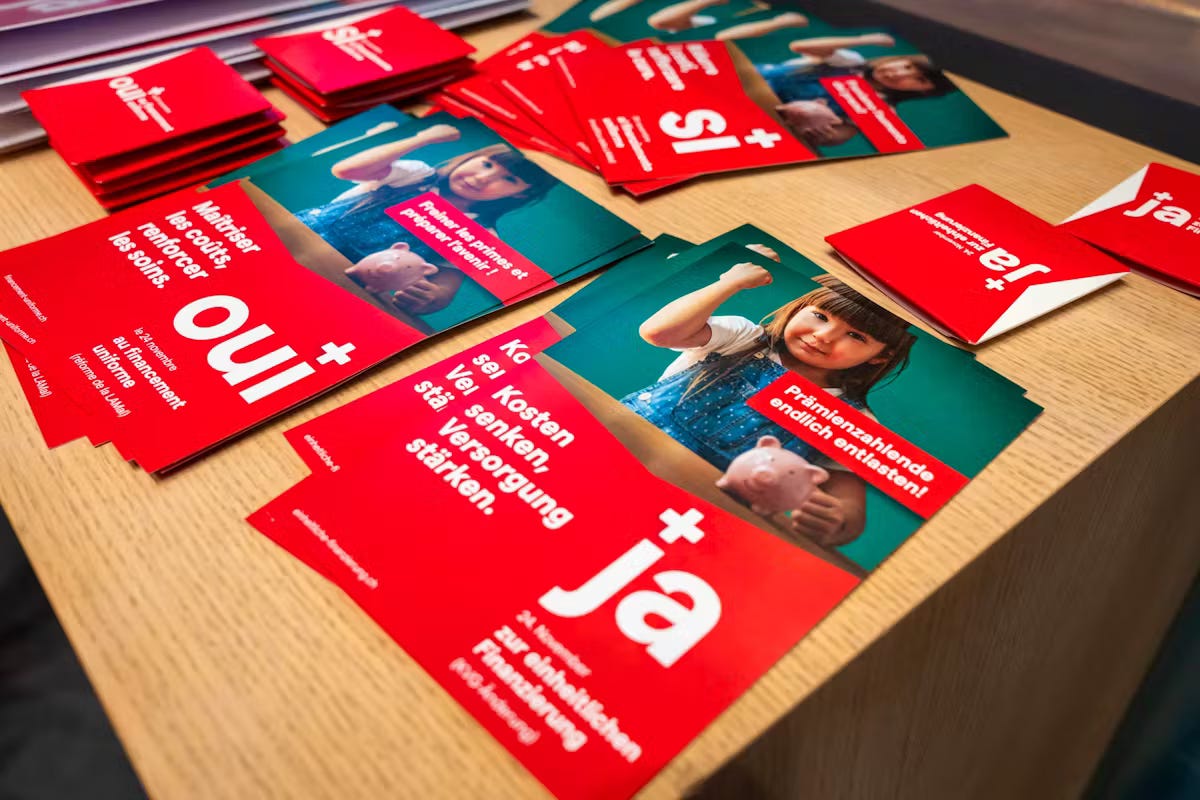Cutting and Wasting
Swiss Post overhaul, hot debates on health reform, a big bank deal for climate change
Dear Insider,
Simple solutions are often dangerous.
Sophisticated ones seems smart - but have their own problems too.
Two of the biggest “systemically relevant” enterprises in Switzerland - the postal service and the health system - need to change.
But the methods… Well, that’s another story.
Post CEO Roberto Cirillo think he has an answer. But it looks (to many people) to be overly simplistic.
Cost-cutting is the easy way out, of course.
When it comes to the finances of the Swiss health care system - reforms are more of a balancing act.
But how far is far enough…or too far? That’s the 64 million franc question….
Enjoy!
Ian
💡 PS: Let’s connect on LinkedIn and on X as well.
📬 Gone,postal…
Big, systemically relevant companies rarely do well in the long run.
Especially in the wild and wooly world of free markets…
Switzerland - unfortunately - is no exception.
But that reality is getting hard to swallow when it comes to a Swiss icon.
Swiss Post plans to reduce its network of self-operated branches to 600 by closing 170 locations while partnering to maintain services in impacted areas.
The decision was driven by declining customer demand—counter transactions have dropped by 50% since 2010, with in-person payments down by two-thirds and usage decreasing by 10% annually.
These shifts have led to financial losses for Swiss Post, which operates without government subsidies and aims for financial self-sufficiency.
To adapt, Swiss Post is investing 100 million Swiss francs in modernizing its remaining branches and intends to maintain a service presence at 2,000 locations through various models.
The Inside Look:
💡The fact that Swiss Post operates without a government budget only makes the current situation more ironic. The postal system remains critical to the country’s operations - but is treated like a fully-commercial enterprise.
💡Swiss Post CEO Roberto Cirillo bears the brunt of criticism for the company’s current situation.
His McKinsey background seemed like a plus - at one time. Now his cost-cutting measures look short-sighted. Some call him the worst CEO…ever.
💡One more thing - some astute journalists at Blick noticed that the post office in the 2300-person village of Swiss Post President Christian Levrat will not be closed. Go figure…
🧢 Hard hats
In response to the Young Socialist (Juso) 50% inheritance tax referendum, the youth wing of the Swiss People’s Party (SVP) has taken to producing a singular campaign item…
…a red MAGA-like hat with the slogan “Make Switzerland poor again?”
The message is clear: taxing wealth at extreme levels would ruin one of Switzerland’s main industries - wealth management.
🩺 Of (re)form with EFAS
Something is (sort of) rotten in Switzerland.
And it’s not on Paradeplatz.
After another year of sharply rising healthcare insurance premiums, the country has had enough. Or has it?
The upcoming Swiss referendum on the healthcare financing aims to introduce a unified system for healthcare financing by merging the funding of ambulatory and inpatient services.
(The acronym EFAS stands for: Einheitliche Finanzierung von ambulanten und stationären Leistungen)
Supports, including Federal Councillor Elisabeth Baume-Schneider, believe will simplify the system and potentially slow rising insurance premiums.
Critics on left - including SP Vice President David Roth - argue it may increase financial pressure on insurance premiums and grant excessive power to profit-driven insurance companies.
The Swiss go to the polls for a final decision on 24 November 2024.
The Inside Look:
💡The left-right split on the issue of health care finance is starting to create long-term tensions - within the left-wing parties. SP Federal Councillor is (again) opposing her own party on the issue.
💡No one knows if the combined financing plan will play out for the better - or worse. And such reforms are not easily changed once implemented. Expect a bitter fight to come…
💡 Who’s an angel? 10 Swiss Angel Investors
People with money don’t like to waste it. Nor do they like to let it lie around doing nothing. In Switzerland, there is a growing class of experienced (and successful) angel investors. Here’s the list of who to know…
💨 How money “works”
Not all big banks - in the US - are to be hated.
After all, their money “works” too. That’s the conclusion of Swiss carbon removal startup Climeworks.
Founded in 2009 by engineers Christoph Gebald and Jan Wurzbacher, the company has signed a significant contract with Morgan Stanley to permanently remove 40,000 tons of CO₂ by 2037.
It marks the US megabank’s first investment in Direct Air Capture (DAC) credits.
This long-term partnership supports Climeworks’ expansion in the United States, particularly through its involvement in the Department of Energy-backed Project Cypress DAC Hub.
It also reinforces Morgan Stanley's commitment to achieving net-zero financed emissions by 2050 and mobilizing $1 trillion in sustainable finance by 2030.
The Inside Look:
💡Expansion beyond Switzerland is generally acknowledged as key for any ambitious company - especially in an area of cutting edge technology. The Morgan Stanley partnership is a big win for ClimeWorks.
💡The fact that a Swiss company signed such a partnership with one of UBS’s biggest rivals globally is….telling. Were the Swiss bankers not ambitious enough? Or is climate change just an empty slogan with them?
📈 A chart is worth…
If advocates for closer ties for Europe needed any evidence - this is it. Europe remains Switzerland’s largest trading partner - at more than 2-to-1 over America.
The Bonus
🚅 Shiny & (not) new - SBB proudly presented the improvements of fleet of InterCity trains. The 44 long-distance trains have reached the halfway point of their life-cycle. (Link)
🪙 All that glitters - According to a Univ. of St. Gallen study, there is over 200 tonnes of gold held by residents of Switzerland - a total value of 15 billion Swiss francs. (Link)
⛑️ Residents with benefits - The percentage of Swiss residents from 3rd-countries receiving social benefits fell by 0.5% to 6.7%. That is roughly 2% less than in the time period 2015-2017. (Link)








